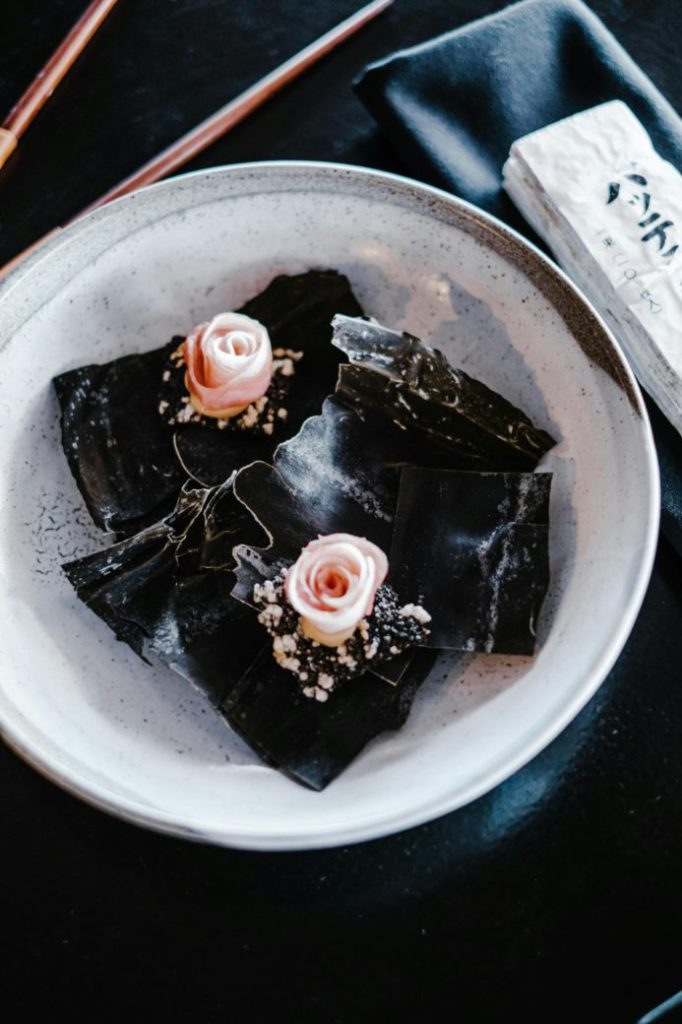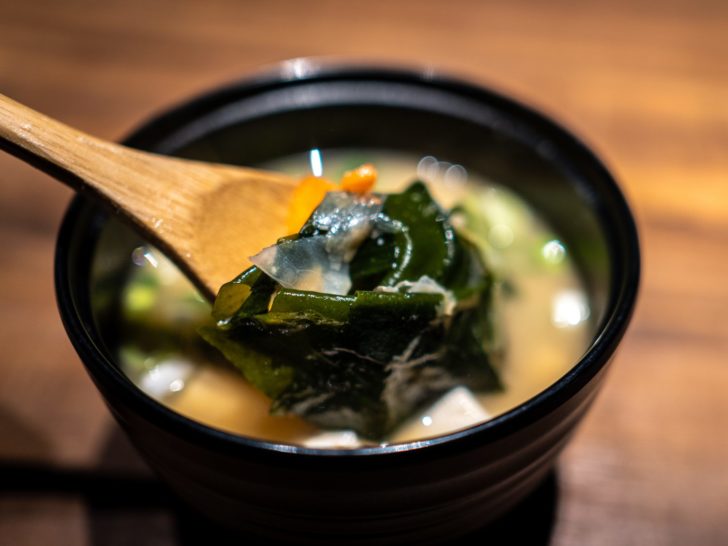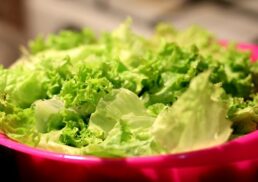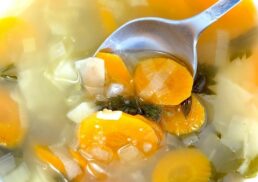Seaweed has long been a staple in Asian cuisine, and now it’s time to unlock the benefits of one versatile and delicious variety: kombu. This edible seaweed not only adds depth and umami to dishes, but it also boasts an impressive array of health benefits. Get ready to dive into the world of kombu, exploring its unique taste, uses in Japanese cuisine, and creative recipe ideas for both vegetarians and vegans.
Table of Contents
Key Takeaways
Kombu is a versatile seaweed with unique flavor and numerous health benefits.
It can be used to enhance the flavor of dishes, aid digestion, provide essential vitamins and minerals, assist in sugar breakdowns, and offer antioxidant properties.
Kombu should be consumed in moderation as it may contain traces of organic arsenic or lead to iodine overconsumption.
Discovering Kombu: A Versatile Seaweed

Japanese kombu, a highly versatile edible seaweed, is widely consumed in Japanese cuisine. Its unique taste and the ability to add a rich umami flavor make it a popular ingredient in various dishes, including those featuring wakame seaweed.
Kombu also offers numerous health benefits, notably its rich source of iodine, which promotes proper thyroid function.
What Is Kombu?
Kombu is a type of kelp seaweed, specifically Saccharina japonica (Laminaria japonica), which kombu thrives in cold, nutrient-rich waters. Its rich umami flavor and nutritional density make it a valuable addition to various dishes, from traditional Japanese cuisine to modern plant-based recipes, all while providing the unique kombu taste.
The rich umami flavor and nutritional benefits of kombu make it a favored ingredient in vegetarian cooking.
The Role of Kombu in Japanese Cuisine
Kombu plays a vital role in Japanese cuisine, with its primary application being as a base for dashi soup stock. Dashi, a foundational Japanese soup stock, is made using kombu and other ingredients such as katsuobushi, shiitake mushrooms, and niboshi.
Kombu is also utilized for cooking beans, as it helps to soften them and improve their digestibility. This versatile seaweed, including its powdered kombu form, has been a fundamental flavoring in Japan for over a thousand years.
Nutritional Profile of Kombu
Kombu is packed with essential nutrients that contribute to its status as a superfood. It is enriched with:
Iodine
Calcium
Iron
Magnesium
Potassium
Vitamins A and C
Copper and zinc trace minerals
Kombu’s iodine content is instrumental in producing healthy hormones and maintaining thyroid function.
Iodine and Thyroid Health
Iodine is essential for thyroid health, as it is necessary for the formation of thyroid hormones. However, consuming too much iodine from kombu may lead to thyroid issues, particularly for individuals with prior conditions or who are taking medication.
Moderation in consuming kombu is key, especially for those with pre-existing conditions or taking medication. Always consult with your doctor to prevent potential complications.
Other Health Benefits
Kombu offers other health benefits in addition to its iodine content. It is known to be beneficial in:
Aiding digestion
Providing essential vitamins and minerals
Assisting in the breakdown of complex sugars found in beans, thus reducing the production of gas and promoting regular bowel movements
Providing antioxidant properties derived from fucoxanthin and polyphenols
These properties contribute to its overall health benefits.
Types of Kombu and Their Uses

There are different types of kombu, each with its own distinct flavor and texture, and specific culinary purposes. The three primary types of cooking kombu are Ma Kombu, Rishiri Kombu, and Rausu Kombu. Each type is suited for different dishes and techniques, allowing you to enhance the flavors of your meals with the perfect kombu variety.
Ma Kombu
Ma Kombu is characterized by:
Its light brown, wedge-shaped fronds
Its distinctive flavor that is not fishy but rather mushroom-like, providing depth and umami to dishes
Its texture, which is narrower and firmer compared to other types of kombu.
It is often used in traditional Japanese dishes such as Kombu Tsukudani (Simmered Kombu), Kombu Dashi (Kombu Soup Stock), and noodle soup.
Rishiri Kombu
Rishiri Kombu is a hard, narrow variety of seaweed known for its strong, aromatic flavor. It is widely believed to be the optimal kombu for dashi, a Japanese soup stock, as it imparts umami flavor to a range of Japanese dishes.
Furthermore, Rishiri Kombu is renowned for its nutritive value and is a commendable source of essential minerals such as iodine.
Rausu Kombu
Rausu Kombu is a thin, wide variety renowned for its luxurious, delicate, and aromatic broth, suitable for a variety of dishes. It has a sweeter, saltier, and harder consistency than other types of kombu, with a thinner texture and a rich, savory, and clear dashi.
As such, it is often regarded as the most desirable kombu for dashi and is suitable for dishes like Salmon Kombu Rolls and non-clear soups.
Cooking with Kombu: Techniques and Tips
Kombu can be used in a variety of cooking techniques, from making dashi to enhancing the flavors of soups and stews, and even tenderizing proteins like beans.
Learning how to cook with kombu effectively can elevate your dishes and bring out the best flavors possible in Japanese cooking.
Making Dashi
Dashi, a foundational Japanese soup stock often used in miso soup, is made using kombu. To create dashi using kombu, follow these steps:
Fill a pot with 4 cups of water.
Add a 4-6″ strip of kombu to the pot.
Cover the pot and simmer for 20 minutes.
If desired, add soy sauce for extra flavor.
Kombu’s rich mineral content and umami flavor make it a perfect ingredient for creating dashi.
Softening Beans
Kombu can be added to beans to soften them and improve their digestibility. It contains enzymes that facilitate the breakdown of oligosaccharides in beans, which are the primary sources of gas production. This enzymatic action softens the beans, thus making them more digestible. It is recommended to use a piece of kombu equivalent in size to a stamp for each pot of beans.
Enhancing Soups and Stews
Kombu can also be used to enhance the flavors of soups and stews. It is particularly beneficial when used with root vegetables such as carrots, parsnips, and turnips, as it imparts a rich umami flavor that complements their natural sweetness.
To use kombu in soups and stews, simply add a small piece to the pot during cooking, and allow it to simmer with the other ingredients, releasing its flavors into the broth.
Shopping and Storage Guide
To ensure the freshness and quality of kombu, it’s important to know where to buy it, how to choose the best, and how to store it properly. Follow these simple guidelines to appreciate the best that kombu can bring to your dishes.
Where to Buy
Kombu can be purchased at Japanese and Asian grocery stores, health food stores, and online. Some recommended online stores for purchasing kombu include Amazon, Sunrise Mart, Ocean’s Balance, Anything from Japan, and Chef’s Armoury.
It can also be found in regular supermarket chains, typically located in the Asian cooking aisle or the international aisle, along with other seaweed products.
Choosing Quality Kombu
When selecting kombu, consider the usage frequency, size, and expiration dates to ensure optimal quality. High-quality kombu is cultivated and grown downwards, producing very good quality dashi, and is carefully selected to ensure its high quality. Avoid kombu with dirt, impurities, or a strong unpleasant odor, as these may indicate low quality.
Storing Kombu
For optimal freshness, store kombu in an airtight container in a cool, dark place. It can last up to a year under these conditions. Factors such as:
temperature
humidity
light exposure
packaging
should be considered, as they can influence the freshness of the stored kombu.
Vegetarian and Vegan Cooking with Kombu
Kombu is a popular superfood for vegetarians and vegans, as it is a natural source of flavor enhancement and essential nutrients. With its unique taste and health benefits, kombu can be creatively incorporated into various vegetarian and vegan dishes, making it a valuable addition to plant-based diets.
Kombu as a Superfood
Kombu is considered a superfood due to its abundance of nutrients, including:
Iodine
Iron
Calcium
Zinc
Copper
Manganese
Magnesium
Potassium
These essential nutrients make kombu an ideal plant-based alternative to animal products, providing health benefits and flavor enhancement to vegetarian and vegan meals.
Creative Recipe Ideas
Incorporate kombu into various vegetarian and vegan dishes for added flavor and nutrition. Some creative recipe ideas include Vegan Dashi, a plant-based Japanese soup stock made with dried shiitake mushrooms and dried kelp, and Kombu and Shiitake Dashi, which provides a distinctive umami taste to dishes. Other vegetarian dishes that incorporate kombu as a primary component include Kombu Dashi, Vegan Dashi, and Kombu and Shiitake Dashi.
Detailed recipes for these dishes can be found on websites such as Just One Cookbook and Epicurious.
Check out Kombu Recipes & Menu Ideas.
Precautions and Potential Risks
While kombu offers numerous health benefits, it is important to be aware of potential risks and precautions when consuming it. Excessive consumption of iodine from kombu may lead to thyroid issues, particularly for individuals with prior conditions or who are taking medication. Additionally, some kombu products may have a Prop 65 warning label due to traces of organic arsenic, but it is generally considered safe when consumed in moderation.
Iodine Overconsumption
Excessive consumption of iodine from kombu may cause thyroid problems, especially for those with pre-existing conditions or on medication. The recommended daily intake of iodine for adults is 150 micrograms, and one gram of raw dried kombu contains 1,542 micrograms of iodine.
Moderation in consuming kombu is key, especially for those with pre-existing conditions or taking medication. Always consult with your doctor to prevent potential complications.
Organic Arsenic Traces
Some kombu products may have a Prop 65 warning label due to traces of organic arsenic, which can be found in the form of arsenosugars. However, the levels of organic arsenic in kombu are generally not harmful unless consumed in excessive amounts.
To minimize the risk of arsenic exposure, soak the kombu in water before cooking and consume it in moderation.
Summary
Kombu, a versatile and nutritious seaweed, offers a wealth of benefits for those seeking to enhance their culinary creations and improve their overall health. From its unique umami flavor to its essential nutrients, kombu is a valuable addition to any diet, particularly for vegetarians and vegans. By understanding the different types of kombu, their uses, and how to choose and store them properly, you can enjoy the best that kombu has to offer in your dishes. So why not dive into the world of kombu and explore its myriad of culinary possibilities?
Frequently Asked Questions
What is kombu?
Kombu is an edible seaweed widely consumed in Japanese cuisine and known for its umami flavor and nutritional benefits.
How is kombu used in Japanese cuisine?
Kombu is widely used in Japanese cuisine as a base for dashi soup stock and to cook beans, helping to make them more digestible.
What are the health benefits of kombu?
Kombu is a nutrient-rich seaweed that supports thyroid health, aids digestion, and provides essential vitamins and minerals.
How can I incorporate kombu into vegetarian and vegan dishes?
Kombu can be used to create delicious vegan dishes like dashi and enhance soups, stews, and other dishes with its umami flavor.
What precautions should I take when consuming kombu?
It is important to consume kombu in moderation and be mindful of iodine overconsumption, as excessive intake may lead to thyroid issues. If you have any pre-existing conditions or are taking medication, it is advisable to seek medical advice before consuming kombu.









